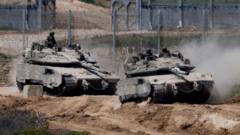The Israeli security cabinet has authorized an extensive military operation against Hamas, aimed at capturing Gaza and enhancing pressure for hostage negotiations amid intensified humanitarian concerns.
Israel's Security Cabinet Greenlights Strategic Expansion of Gaza Offensive

Israel's Security Cabinet Greenlights Strategic Expansion of Gaza Offensive
Israeli forces prepare for a major military escalation as humanitarian aid plans face criticism.
Israel's security cabinet has officially endorsed an expansive military strategy against Hamas, signaling a significant escalation in the region. This plan, which focuses on capturing Gaza and maintaining a prolonged military presence, comes as Israeli military forces have mobilized tens of thousands of reservists in anticipation of the upcoming operations.
In what has been characterized as "increasing pressure" on Hamas, reports suggest the full implementation of this strategy will occur following U.S. President Donald Trump's visit to the Middle East next week. This move is aimed at not only securing the return of remaining Israeli hostages but also weakening Hamas’ influence in the area.
Central to the cabinet's decision was a unanimous vote approving a gradual extension of ground operations in the region over several months. This includes plans to seize additional territories and expand a designated "buffer zone" bordering Israel and Egypt. Such actions are aimed at bolstering Israel's leverage in negotiations concerning a new ceasefire and the release of hostages.
Israeli Prime Minister Benjamin Netanyahu reportedly emphasized that this operation marks a departure from previous tactics, focusing on territorial occupation rather than short, raid-based missions. The security cabinet member Zeev Elkin pointed out that there remains a "window of opportunity" for a potential hostage release before Trump's Middle Eastern trip, should Hamas acknowledge the seriousness of Israel’s military intentions.
As the military gears up, Chief of Staff Lt. Gen. Eyal Zamid spotlighted the mobilization of reserves to enhance operations in Gaza, with a focus on dismantling terrorist infrastructure. However, critics highlight the lack of tangible outcomes with no hostages released since the resumption of conflict six weeks ago. The Hostages and Missing Families Forum expressed concern that the government's prioritization of territorial gains over hostages goes against public sentiment, with 70% of Israelis voicing opposition to this direction.
Parallel to military maneuvers, discussions around humanitarian efforts have arisen, particularly the potential resumption of aid deliveries through private companies. Critics from humanitarian organizations warn that this approach contradicts basic principles of humanitarian aid and could lead to severe consequences for civilians in Gaza, especially as significant portions remain cut off from essential supplies since the blockade began on March 2.
The UN and various aid agencies have voiced strong opposition to the Israeli proposal, asserting that redirecting aid through Israeli-controlled channels could exacerbate existing humanitarian crises. The alert remains high as the ongoing military conflict, ignited by a cross-border offensive on October 7, 2023, which led to significant casualties on both sides, continues to unfold, with the toll in Gaza reported as exceeding 52,000 fatalities.
In what has been characterized as "increasing pressure" on Hamas, reports suggest the full implementation of this strategy will occur following U.S. President Donald Trump's visit to the Middle East next week. This move is aimed at not only securing the return of remaining Israeli hostages but also weakening Hamas’ influence in the area.
Central to the cabinet's decision was a unanimous vote approving a gradual extension of ground operations in the region over several months. This includes plans to seize additional territories and expand a designated "buffer zone" bordering Israel and Egypt. Such actions are aimed at bolstering Israel's leverage in negotiations concerning a new ceasefire and the release of hostages.
Israeli Prime Minister Benjamin Netanyahu reportedly emphasized that this operation marks a departure from previous tactics, focusing on territorial occupation rather than short, raid-based missions. The security cabinet member Zeev Elkin pointed out that there remains a "window of opportunity" for a potential hostage release before Trump's Middle Eastern trip, should Hamas acknowledge the seriousness of Israel’s military intentions.
As the military gears up, Chief of Staff Lt. Gen. Eyal Zamid spotlighted the mobilization of reserves to enhance operations in Gaza, with a focus on dismantling terrorist infrastructure. However, critics highlight the lack of tangible outcomes with no hostages released since the resumption of conflict six weeks ago. The Hostages and Missing Families Forum expressed concern that the government's prioritization of territorial gains over hostages goes against public sentiment, with 70% of Israelis voicing opposition to this direction.
Parallel to military maneuvers, discussions around humanitarian efforts have arisen, particularly the potential resumption of aid deliveries through private companies. Critics from humanitarian organizations warn that this approach contradicts basic principles of humanitarian aid and could lead to severe consequences for civilians in Gaza, especially as significant portions remain cut off from essential supplies since the blockade began on March 2.
The UN and various aid agencies have voiced strong opposition to the Israeli proposal, asserting that redirecting aid through Israeli-controlled channels could exacerbate existing humanitarian crises. The alert remains high as the ongoing military conflict, ignited by a cross-border offensive on October 7, 2023, which led to significant casualties on both sides, continues to unfold, with the toll in Gaza reported as exceeding 52,000 fatalities.





















